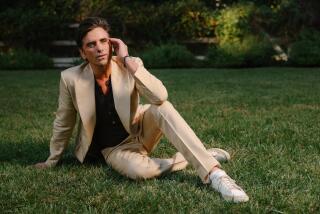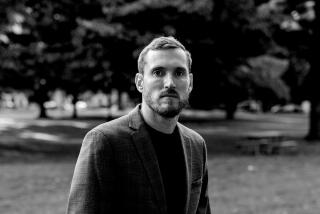Father’s Mind-Set Is Liberated
- Share via
SALISBURY, Mass. — For years, novelist Frank Schaeffer buried his nose in a book while the same waitress poured his coffee at Angie’s Diner. Schaeffer usually kept his conversation to: “Check, please.”
But he formed a bond with her that surprised them both when he learned they both had sons in the Marines. After his youngest son called unexpectedly late last week to say he was safe “somewhere in the Middle East,” Schaeffer rushed to the diner the next day to share the news with Marie Dawson.
For the record:
12:00 a.m. April 25, 2003 For The Record
Los Angeles Times Friday April 25, 2003 Home Edition Main News Part A Page 2 National Desk 0 inches; 29 words Type of Material: Correction
Marine -- An April 14 article in Section A incorrectly identified Marine Cpl. John Schaeffer as an intelligence officer. Schaeffer is an intelligence specialist, serving in the Middle East.
A teary Dawson wrapped Schaeffer in a hug when she heard what Cpl. John Schaeffer, a 22-year-old intelligence officer, had said to his father. “Isn’t it nuts that they’re paying me to do a job I would pay them to do?”
And he added: “I am a part of history.”
Even drawing on his finest sensibilities as a novelist, Frank Schaeffer would not have imagined this scene before his youngest son became a Marine four years ago, straight out of an exclusive private school.
Schaeffer, whose books include “Portofino” and “Saving Grandma,” was most at home mingling with poets in New York and filmmakers in Los Angeles. All he knew about the Marines, he said, “was that they came back in body bags and were buried in flag-draped coffins.”
Like many in what he termed “the knowledge class,” he had devoted little thought to the workings of the military. He was content to view protecting the country as a job for other people’s children.
Then he had to come to grips with his son’s decision and found himself on an unexpected journey of self-discovery. It forced Schaeffer to confront the prejudice against military service held by his wealthy and well-educated acquaintances -- people just like him. Schaeffer encountered widespread ambivalence -- even outright antagonism -- among those men and women, whose own grandfathers considered it an honor to serve their country.
What Schaeffer, 50, termed his “elitist bubble” was forever punctured when he sent his son off to boot camp at Parris Island. Gone was the sense of safety, control and entitlement that until then he took for granted.
“Having John in the Marine Corps made me realize that I was not entitled to anything,” Schaeffer said, “including a good night’s sleep.”
To his amazement, Schaeffer formed new connections outside his rarefied circle.
The mechanics at the local garage became buddies who repaired Schaeffer’s truck ahead of schedule -- and at a fraction of the estimate -- after they spotted his “U.S. Marines” bumper sticker.
The postal clerk who once wordlessly sold him stamps now routinely inquired about Schaeffer’s son.
And in waitress Dawson, Schaeffer found a friend who echoed his pride, his fears and his confusion over the war in Iraq.
“Frank and I never talked much before,” Dawson said. “But we have become friends because we are going through the same thing.”
Dawson, 47, is an Irish immigrant who waits on tables to support her family. Her two sons are in the Marines, one in Okinawa and the other at Camp Lejeune, N.C. Neither boy was born in the U.S., yet each had signed up to fight for his adopted country.
“It makes me so proud,” she said. “But it is also frightening.”
Schaeffer’s two oldest children went to prestigious Eastern universities. His wife, Genie, runs a boutique publishing company specializing in Greek Orthodox texts. They live in a big brick home on the Merrimack River, an affluent area an hour’s drive north of Boston. He calls himself “just another yuppie fascist snob.”
*
John Schaeffer joined the Marines without telling his parents, who blissfully assumed he would head off to college.
The attraction, he said later, was based on a fascination with military history, especially Winston Churchill and Dwight D. Eisenhower -- as well as fond memories of childhood war games played on the sand dunes near the family home.
His decision prompted family friends to cast quizzical, even pitying, glances in the Schaeffers’ direction. “The Marines?” some wondered. “Aren’t they awfully Southern?”
That was a predictable reaction, said retired Army Gen. John Reppert. Among the well-educated and the well-to-do, armed services duty lacks prestige, Reppert said.
“The sentiment seems to be: ‘I am delighted that those young people are out there doing that. I am very happy for them. But I would not want my child out there doing that,’ ” said Reppert, who was drafted 33 years ago.
For generations, privileged Americans viewed joining the military as a form of public service -- both an obligation and a rite of passage, said Reppert, director of the Belfer Center for Science and International Affairs at Harvard’s John F. Kennedy School of Government.
“But that no longer exists,” he said. “The relationship between military service and public service today is almost coincidental.”
In his own home, John Schaeffer’s mother, Genie, asked him what he expected to have after four years in the Marines: A skill? A degree? His sister Jessica, now 34 and living in Finland, was dumbfounded. Middle child Francis Schaeffer, now 30 and teaching at the school where all three siblings were educated, told his father: “I can picture his funeral very well.”
Frank Schaeffer anguished. He asked himself, “What did I do wrong? How did I fail my son that he would do something so completely out-to-lunch as signing up for the Marines?”
Maybe John read one too many books about war at bedtime, Schaeffer speculated. “Was it the war games? Did I yell at him too much?”
Gradually, he came to accept the fact that his son had chosen his own path. Joining the Marines was a statement of individuality for John, not an expression of rebellion, his father discovered.
Their odyssey toward resolution and mutual understanding forms the theme of “Keeping Faith,” a book John and Frank Schaeffer wrote together. Since the first printing of 6,000 copies last year, the book has gradually found a growing audience among relatives of people in the military. It now sells 1,000 copies per week.
Schaeffer is deluged every day with dozens of e-mails from mothers and fathers, brothers and sisters, even grandparents -- all with family members in the armed forces. Although he insists that “nothing could have been farther from the picture I had of my own life,” Schaeffer has become a sympathetic figure, someone with whom his readers seem to identify because he has thrashed out the same issues they are struggling with.
Schaeffer spends hours each day replying to these messages, which have only increased in volume with the war in Iraq.
All his correspondents -- from the 80-year-old retired colonel to the 17-year-old who enlisted in the Marines only days before -- echo Schaeffer’s pride in the young people who fight for America. Most voice his concern about the war in Iraq. Others say that in a country that neither requires nor encourages military service among its young citizens, they long for connections -- and even more so, for respectability.
A 22-year-old anthropology student from a large Southern university wrote Schaeffer of her frustration in seeking letters of recommendation for the Navy.
“Many of my professors have praised me as an academician but refused to write the recommendations for me on the basis that they are conscientious objectors,” she said in her message. “I have even been informed that I will never be truly accepted into the anthropological community after my service and should not hinder my future so much. The truth of it is, all of my school has been hostile toward the military.”
The Schaeffers themselves ran into similar antipathy when John returned last fall to his high school for a reading of “Keeping Faith.” Frank became livid when a father chastised the headmaster for allowing the school to be used as “a forum to promote militarism and to encourage kids to become hired killers.” The father was a professor from an Ivy League university, Schaeffer noted, his teeth still clenched in anger over an incident that took place months ago.
“In our elite, there are not very many categories for intelligent, humane discourse about the military,” Schaeffer said. “What you see and hear tends either to be a ‘Catch-22’ portrayal or some rah-rah right-wing tract. It’s either ‘Saturday Night Live’ or it’s ‘Rambo.’ ”
*
President Kennedy and his three brothers served in the military, said Northwestern University professor Charles Moskos. But none of their own children joined the armed forces, he noted.
Moskos recently asked a group of Army recruiters whether they would prefer to have their advertising budgets tripled or to have Chelsea Clinton join the Army.
“They unanimously chose the Chelsea option,” he said.
But Schaeffer said he and his son did not write their book to set the record straight on the value of military service. Mostly, Schaeffer said, it was a way to stay in touch with his son. While John was in Arizona recovering from an injury -- a Marine buddy dropped a barbell on his foot -- Frank persuaded him to jot down his experiences in the military, along with childhood recollections.
The book is told in alternating voices, father and son, with some of John’s poetry included as well. It was written before the terrorist attacks of Sept. 11 made patriotism newly fashionable, Schaeffer said. “This was not a book that got crashed out to take advantage of some military and political situation.”
While his father spends hours corresponding with readers such as former First Lady Barbara Bush, John is on assignment in the Middle East. His intelligence work is secretive; he cannot tell his parents where he is.
Last week’s phone call was unexpected because John had told his family he might be out of contact for months.
Schaeffer was relieved to hear his son sounding confident. But his own fears linger. “He’s 22 years old. I think any rational parent would be terrified,” Schaeffer said.
The last time John was home, Schaeffer asked his son whom he thought he was defending. Was it his country? Was it something as broad and abstract as democracy? Was it his bunkmate from the Bronx?
John answered without hesitation.
“The only image that comes to my mind is you and Mom, sitting at the breakfast table,” he said. “I do this for you and Mom.”
More to Read
Sign up for our Book Club newsletter
Get the latest news, events and more from the Los Angeles Times Book Club, and help us get L.A. reading and talking.
You may occasionally receive promotional content from the Los Angeles Times.










